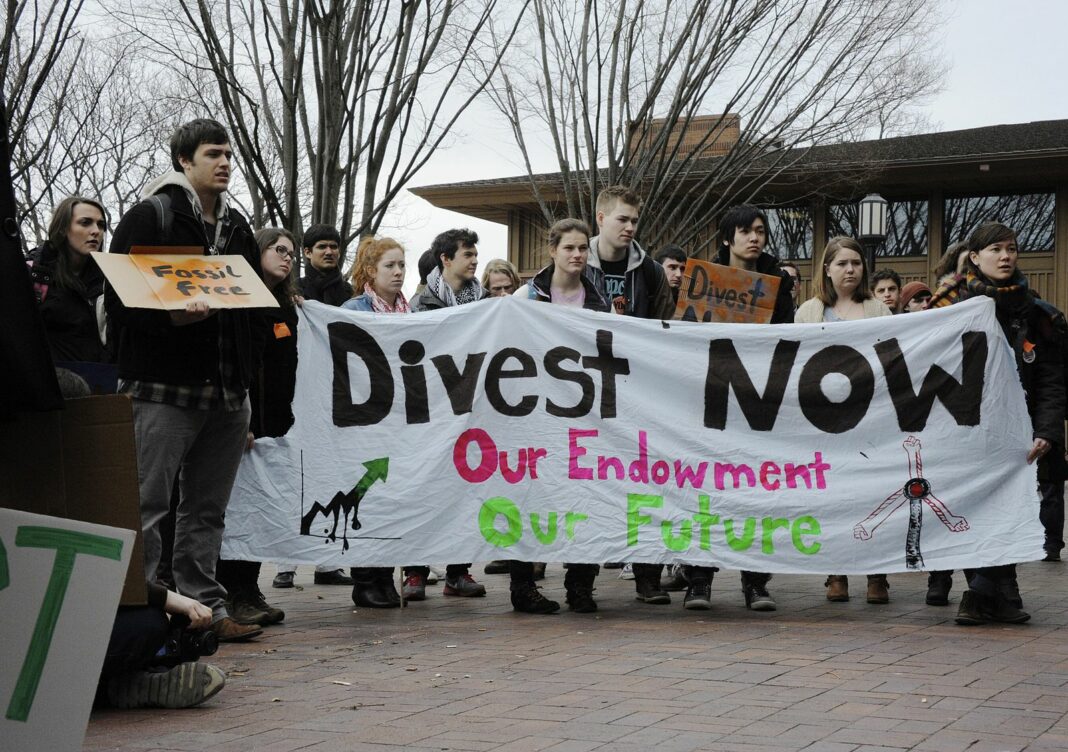You’ve likely heard that the burning of fossil fuels is the single largest contributor to the warming planet. And chances are you also know that the situation is dire — the Intergovernmental Panel on Climate Change (IPCC) declared that the global carbon budget will be reached in the next 15 to 25 years if the world burns fossil fuels at its current pace of 50 billion tons per year. Adding to the sense of urgency is the economic power of the fossil fuel industry — which earned $2.1 trillion in revenue in 2021 — and has no plans to stop drilling. While the fossil fuel colossus might stand in the way of a green economy, a growing divestment movement has already begun to topple it.
Divestment is the removal of investments from the stocks of fossil fuel companies, and from bonds and funds that back them. By divesting, activists seek to apply economic pressure by depriving these companies of cash from investors. This sort of pressure can bring about social change by forcing companies to act differently. The fossil fuel divestment movement has made tremendous gains, with more than 1,300 institutions, with assets over $14.6 trillion, having committed to divest from fossil fuels to date. In the last few weeks alone, Harvard and Boston University have divested their endowments of fossil fuel investments.
The most newsworthy targets of the divestment movement are institutions such as universities, religious organizations, and banks. But individual investors can also put pressure on the fossil fuel industry by divesting and reinvesting in renewable energy.
As with the economics of any other commodity, when demand for a stock decreases, that stock’s value also decreases. James Miller, a former economist at the EPA, says, socially responsible investing aims to make the stock price go down by making it less desirable for investors to invest in that company.
The moral argument for divestment is straightforward — financially supporting the oil and natural gas industries inhibits the transition to alternative energy sources.
There are financial reasons as well — and they’ve been gaining popularity. Since an eventual transition to greener energy is inevitable, some economists believe fossil fuel investments could create a “carbon bubble,” leading to a global economic crisis.
Recent research has indicated that investors have a personal incentive to divest. A recent report by BlackRock, the world’s largest asset manager, claims that portfolios divested from fossil fuels actually saw greater returns than those not divested.
Despite many institutions being slow to divest in a market long driven by oil and gas, the divestment movement has prompted change by major actors. Student activists have persistently called on universities to divest — a recent victory was Harvard’s pledge to divest its $42 billion endowment from all fossil fuel holdings. Other major divestments include pledges from the World Council of Churches, the Rockefeller Brothers Fund, and New York City.
Green banks have cropped up across the U.S., offering an alternative to the nation’s largest banks, which are among the top investors in fossil fuel stocks. Organizations such as Climate Safe Pensions provide a network for pensions to commit to divestment. Environmentally responsible financial advising — a large component of socially responsible investing (SRI) — equips individual investors to finance their values. And activist movements such as 350.org, which establishes local chapters across the country, are rallying public pressure on institutions by spreading awareness of the urgent need to invest in clean energy.
Luke Murphy, managing director of financial services for Martha’s Vineyard Investment Advisors, a division at Martha’s Vineyard Bank, is one of the increasing number of investment advisors across the country expanding their environmentally responsible investing options. Murphy and his advising firm want to let people know that environmentally and socially responsible investing does not have to come at the sacrifice of financial performance — and clients are starting to catch on. “As far as trends go on the Island, we have had an increasing amount of requests from clients and prospects looking to invest in impactful and sustainable environmental, social, and community impact investments,” Murphy said.
As divestment activist and writer Bill McKibben puts it, “Money is the oxygen on which the fire of global warming burns.” Public values are shifting toward environmentally responsible investing, and fossil fuel giants are losing their oxygen supply.


